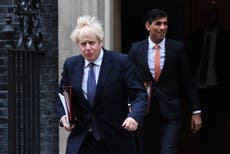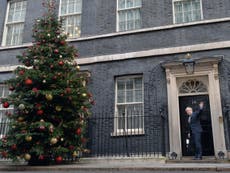Plans to slash £4bn from overseas aid will be blocked until 2022, opponents warn Boris Johnson
Exclusive: Government to be forced to use Parliament Act to overrule rebellious Lords – with a 12-month wait
Your support helps us to tell the story
From reproductive rights to climate change to Big Tech, The Independent is on the ground when the story is developing. Whether it's investigating the financials of Elon Musk's pro-Trump PAC or producing our latest documentary, 'The A Word', which shines a light on the American women fighting for reproductive rights, we know how important it is to parse out the facts from the messaging.
At such a critical moment in US history, we need reporters on the ground. Your donation allows us to keep sending journalists to speak to both sides of the story.
The Independent is trusted by Americans across the entire political spectrum. And unlike many other quality news outlets, we choose not to lock Americans out of our reporting and analysis with paywalls. We believe quality journalism should be available to everyone, paid for by those who can afford it.
Your support makes all the difference.Plans to slash £4bn a year from overseas aid will be blocked until 2022, opponents believe – raising their hopes that Boris Johnson will drop the policy altogether.
The controversial cut is almost certain to be defeated in the House of Lords – with numerous high-profile Tory peers telling The Independent they will fight it – even if it passes in the Commons.
Crucially, the Lords would not be required to give way because the measure breaks an election manifesto pledge, requiring the government to use the Parliament Act to overrule the upper chamber.
And it would be forced to wait 12 months to do so, which means – with the vote in the Commons not due until April – the cut would be stopped until at least mid-2022.
One leading rebel said: “The strength of feeling is even stronger in the Lords. Whether legislation is presented in the Commons or the Lords, the government is staring at a defeat on this.”
A second suggested the political will to make the cut might drain away, if it required the draconian Parliament Act – used only four times in the last 70 years – to be deployed.
“Is Boris Johnson really going to use that act to make what is supposed to be a temporary cut to foreign aid?” the critic asked, adding: “I don’t think so.”
Opposition is growing after Dominic Raab, the foreign secretary, admitted the reduction – from 0.7 per cent to 0.5 per cent of national income – could become permanent.
Baroness Lynda Chalker, a Tory aid minister in the 1990s, told The Independent: “It will not solve the borrowing problem and will store up multiple worldwide health problems for years ahead. The government must think again.“
Baroness Anne Jenkin, who co-founded the Conservative Friends of International Development, said 7 million women in poorer countries would lose access to family planning.
“In the middle of a global pandemic, to pull away support for women and girls in the knowledge that it will cause a generation of unplanned pregnancies, isn’t just the wrong thing to do, it represents an immoral act,” she said.
Baroness Sayeeda Warsi, a former Conservative Party chair, said: “At a time when Britain needs to increase its influence and international reach, this decision makes us appear like a nation in retreat.”
And Baroness Joyce Anelay, a former Foreign Office minister, raised the alarm over the aim of “tackling extreme poverty” being dropped from a list of priorities.
“Aid must not be used to plug funding gaps in the wider FCDO [Foreign Commonwealth and Development Office] and other departments, even at a time of budgetary constraints,” she insisted.
Tory opponents in the Commons are optimistic they will muster the 40-odd rebels needed to defeat the cut in the Commons, where the vote is likely to be staged first.
But parliament’s authorities confirmed that – if the Parliament Act is required to force through the bill gets thrown out in the Lords – the government must wait at least one year after its second reading in the Commons before it can be brought back.
A new session of parliament is also required, which has not yet been announced, although that is likely to get underway in the spring or early summer.
The Salisbury Convention, named after the post-war Tory leader in the Lords, requires the chamber not to obstruct an election commitment – but Mr Johnson’s manifesto vowed to protect the 0.7 per cent figure.
It is unclear how much annual aid would be cut in 2021 – because the 0.5 per cent proportion of gross national income (GNI) depends on the size of the economy – but it’s expected to be close to £4bn.
Rishi Sunak blamed the cut on the “domestic fiscal emergency” triggered by the Covid-19 pandemic, although defence spending was boosted by £4bn at the same time.
Mr Raab then acknowledged he could not “see a path forward back to 0.7 in the foreseeable or immediate future”, insisting it would depend on future “fiscal circumstances”.






Join our commenting forum
Join thought-provoking conversations, follow other Independent readers and see their replies
Comments